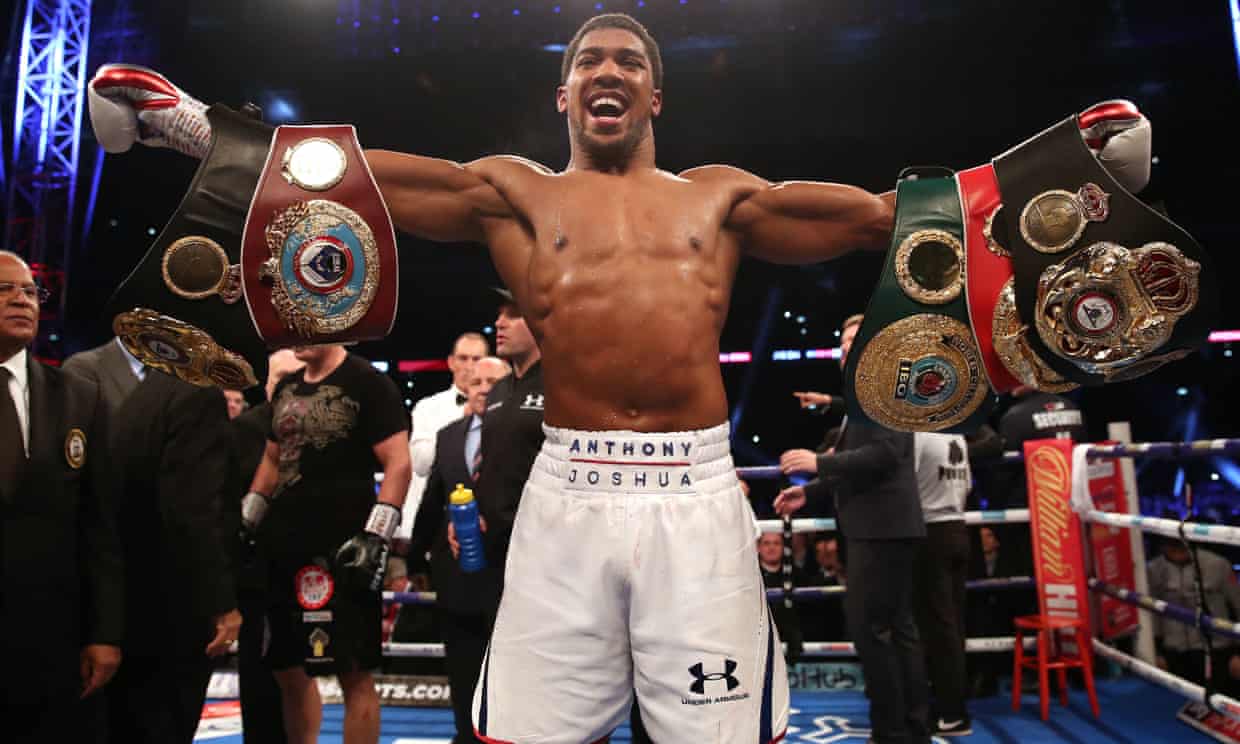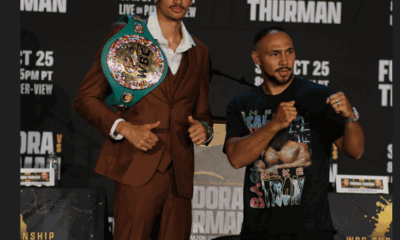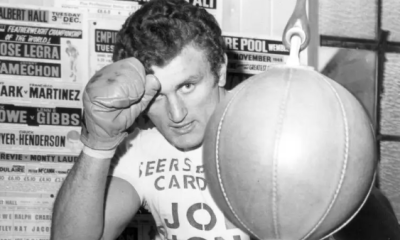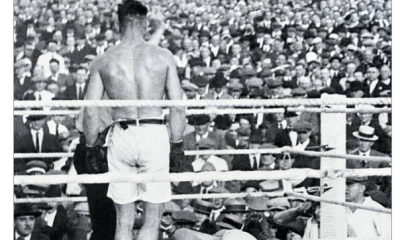Featured Articles
The Force is With Anthony Joshua as `The (British) Empire Strikes Back’

The date was Dec. 8, 2007, and WBC welterweight champion Floyd Mayweather Jr., who had just doused the hopes, if not the enthusiasm, of thousands of British boxing fans who had traveled to Las Vegas from the United Kingdom to cheer countryman Ricky Hatton in his bid to dethrone the favored American, spoke of a trans-oceanic trip he hadn’t made, and never would have to.
“I always wanted to fight in the UK,” Mayweather mused after he had dominated and then stopped the previously undefeated Hatton in the 10th round. “But because I couldn’t, I had the best fighter in the UK come to me.”
Mayweather never made it across the pond because he had the power and leverage to make all challengers travel to a place of his choosing, which frequently was the MGM Grand on the Vegas Strip. When you are the perpetual side `A’ and highest-grossing prizefighter of all time, it’s not difficult to make side `B’ dance to your tune when it comes to negotiating contractual terms.
Times have changed, and the first working assignment in America for British’s vastly popular world heavyweight champion Anthony Joshua (22-0, 21 KOs), who takes on blubbery Mexican-American Andy Ruiz Jr. (32-1, 21 KOs) in the DAZN-streamed main event Saturday night at Madison Square Garden, bears little to no resemblance to the trip made by Hatton nearly 12 years ago. It most definitely is not reminiscent of the seemingly endless decades of failure by British big men, who without exception were required to journey to the United States and take regularly scheduled beatdowns from clearly superior American champions. That happened so often and over so long a period that it resulted in the coining of the term “horizontal heavyweights” to describe the manner in which most of the Brits’ longshot challenges were so emphatically squashed.
The non-boxing British Empire – which once was called “the empire on which the sun never sets” – officially became a thing of the past in 1997 when the UK ceded control of Hong Kong to the People’s Republic of China. It must have been a bitter pill to swallow for a relatively small island nation that, in 1913, held sway over 23 percent of the world’s population and 24 percent of the land mass. The ebbing of British influence in a general sense more or less correlates to the lengthy gap between the heavyweight title reigns of Bob Fitzsimmons, who held the title from March 17, 1897, to June 9, 1899, and the first of three separate title ascendances for Lennox Lewis, achieved when he was arbitrarily declared the WBC champion on Dec. 14, 1992, in place of American Riddick Bowe, who had publicly renounced that sanctioning body’s recognition by dumping its bejeweled green belt into a trash can.
Thus did Lewis, born in London to Jamaican immigrant parents, become the first British world heavyweight champion of the 20th century. And when he made the first defense of that title on May 8, 1993, with a 12-round unanimous decision over former IBF titlist Tony Tucker in Las Vegas, it ended an ignominious streak of 13 consecutive championship-bout defeats by British heavyweights to American titlists, all of which occurred on U.S. soil.
But Lewis did not so much take his various titles back to the UK as to keep them on semi-permanent loan to the U.S. Of the 18 world championship bouts in which he participated, 14 were in America, three in the UK and one in Africa. That, he has consistently stated, was by his choice and in recognition of the United States as the epicenter of all boxing and especially championship-level heavyweight boxing.
“In the beginning when I started boxing in America, I used to get booed because I was the Brit coming over to their country,” said Lewis, now 53 and retired since June 2003. “But when I won over there, they said, `Fine, he’s an OK Brit. He boxes well.’ They accepted me as a good fighter.
“In any case, you really had to go to America in those days for the big fights with Tyson, Holyfield and those guys.”
Similar sentiments were echoed by long-reigning super middleweight champion Joe Calzaghe, the undefeated Welsh southpaw who logged 42 of his 46 career victories in the UK, one each in Germany and Denmark and two – the last two of his storied career – in the U.S., one in Vegas and one in New York.
“Brits, in order to prove themselves, always have to go over to America,” Calzaghe remarked a few days prior to his lifting of The Ring magazine’s light heavyweight championship belt on a 12-round split decision over Bernard Hopkins on April 19, 2008, in Las Vegas’ Thomas & Mack Center.
Ah, but that was then and this is now, most pointedly in a heavyweight division in which America’s stranglehold of all or most of the undisputed and alphabet championships has devolved into a significantly loosened grip. Although the United States, with 54, remains far and away the leader in world heavyweight titles once or now held by representatives of a particular nation, the United Kingdom, a distant second with eight, is doing its best to paint over any lingering vestiges of the dark days of its “horizontal heavyweights,” an era in which defeat not only was anticipated, but accepted without complaint if the occasionally valiant loser exhibited what the British like to call a stiff upper lip.
“They love a loser in this country,” a perplexed Calzaghe said in Wales while preparing for his date with Hopkins. “It’s ridiculous.”
Four of the six Brits to have held some version of the heavyweight crown have done so since Lewis: Herbie Hide (WBO, two reigns), Frank Bruno (WBC), Henry Akinwande (WBC) and, of course, Joshua. But the WBO was not regarded as a “major” organization when it was presenting championship straps to Hide and Akinwande, and even the thickly muscled and beloved Bruno was generally dismissed as a minor player during a time ruled by such renowned U.S. heavyweights as Tyson, Holyfield, Bowe, Larry Holmes, George Foreman and Michael Spinks.
All of which is reason enough to believe that Joshua, an overwhelming favorite over a game but seemingly overmatched Ruiz, will be at the Garden only to better introduce himself to American fight fans before returning to his comfort zone in the UK, where he is far and away the most popular and marketable fighter in Europe. No American fighter – and the only one who can even be mentioned in the same breath at this point is WBC champ Deontay Wilder (41-0-1, 40 KOs) – can pack arenas and even massive stadiums as does Anthony Oluwafemi Olaseni Joshua, the super heavyweight champion at the 2012 London Olympics and son of a Nigerian mother and Nigerian-Irish father. Joshua fought before crowds of 90,000 and 80,000, respectively, for defenses against Wladimir Klitschko and Alexander Povetkin in London’s Wembley Stadium, sandwiched around capacity turnouts of 78,000 in Cardiff, Wales’ Principality Stadium against Joseph Parker and Carlos Takam. If and when Joshua and Wilder agree to a much-anticipated full unification showdown, if AJ wants it on home turf, it will be so, and most likely not for the 50-50 revenue split that Wilder insists should be his because he ostensibly is in possession of the scepter once held by the regal likes of such American heavyweight legends as Jack Johnson, Jack Dempsey, Joe Louis, Muhammad Ali, Foreman, Holmes, Mike Tyson, Evander Holyfield and Riddick Bowe.
Those days, at least for now, are past, and Joshua is a British big man who does not have to go America to stake his claim to what already is demonstrably his. He holds three titles (four, if you include the IBO’s) to Wilder’s one and is the more established drawing card. Unlike other UK heavyweight wannabes, and even champions, including Lewis, he almost always gets to set terms favorable to himself. In a very real sense, until further notice, he is what Mayweather used to be, big enough and important enough to get the world to come to him.
For now, though, he is in America for what could ultimately prove to be a one-and-done. It will be interesting to see if his fans, like those who followed Hatton to Vegas for the likely come-uppance from Mayweather, are as supportive of and passionate about a major favorite as they were of an underdog with a puncher’s chance to defy the odds. Will they again show up by the thousands, screaming themselves hoarse singing “Rule, Brittania” and “God Save the Queen”? Or have they become too comfortably familiar with success, now that it’s Americans, and likely soon a Mexican-American, who is left horizontal on the canvas?
Check out more boxing news on video at The Boxing Channel
To comment on this story in The Fight Forum CLICK HERE
-

 Book Review4 weeks ago
Book Review4 weeks agoMark Kriegel’s New Book About Mike Tyson is a Must-Read
-

 Featured Articles2 weeks ago
Featured Articles2 weeks agoThe Hauser Report: Debunking Two Myths and Other Notes
-

 Featured Articles3 weeks ago
Featured Articles3 weeks agoMoses Itauma Continues his Rapid Rise; Steamrolls Dillian Whyte in Riyadh
-

 Featured Articles3 weeks ago
Featured Articles3 weeks agoNikita Tszyu and Australia’s Short-Lived Boxing Renaissance
-

 Featured Articles4 weeks ago
Featured Articles4 weeks agoKotari and Urakawa – Two Fatalities on the Same Card in Japan: Boxing’s Darkest Day
-

 Featured Articles3 weeks ago
Featured Articles3 weeks agoIs Moses Itauma the Next Mike Tyson?
-

 Featured Articles4 weeks ago
Featured Articles4 weeks agoRamirez and Cuello Score KOs in Libya; Fonseca Upsets Oumiha
-

 Featured Articles2 weeks ago
Featured Articles2 weeks agoBoxing Odds and Ends: Paul vs ‘Tank,’ Big Trouble for Marselles Brown and More





















